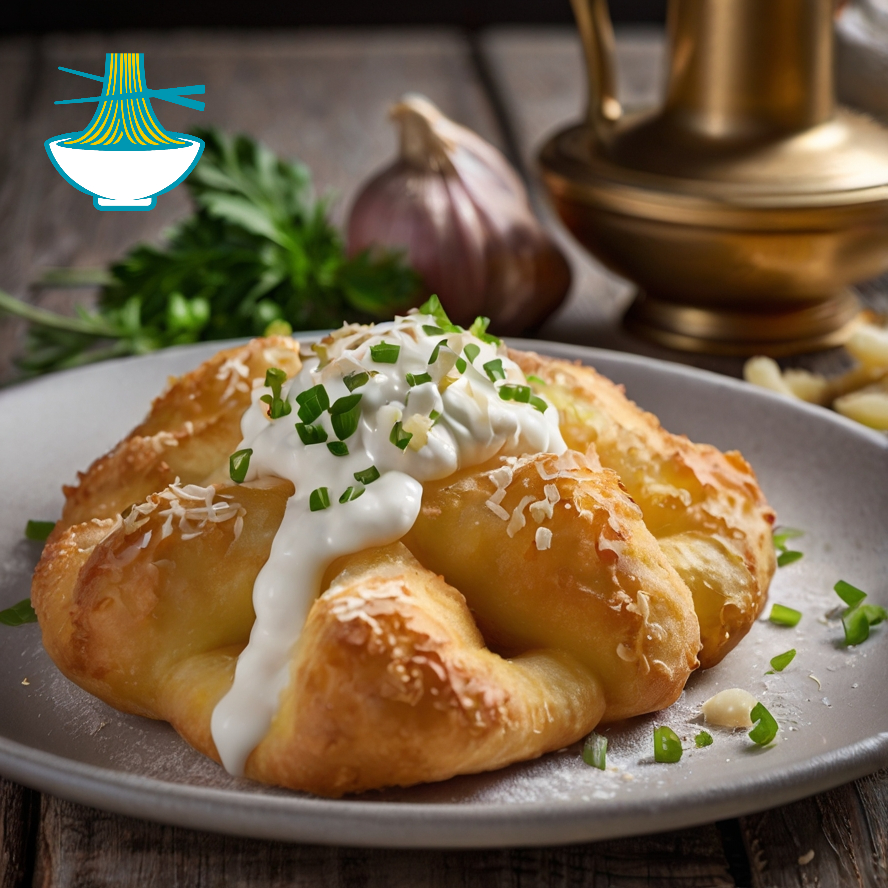Discover how to make Langoš, a delicious deep-fried dough treat perfect for any occasion. This traditional recipe features crispy, golden-brown dough topped with garlic, gooey cheese, and tangy sour cream. Perfect for a savory snack or appetizer, Langoš is a crowd-pleaser that combines crunchy texture with rich, savory flavors. Follow our easy steps to create this delectable Hungarian favorite in your own kitchen!
Ingredients:
- 2 cups all-purpose flour
- 1 cup warm water
- 1 tablespoon active dry yeast
- 1 teaspoon sugar
- 1/2 teaspoon salt
- 2 tablespoons olive oil
- 3 cloves garlic, minced
- 1 cup shredded cheese (e.g., mozzarella or cheddar)
- 1/2 cup sour cream
- Oil for frying
Instructions:
Prepare the Dough:
- In a small bowl, dissolve the sugar in warm water and sprinkle the yeast on top. Let it sit for about 5 minutes until foamy.
- In a large bowl, combine the flour and salt. Make a well in the center and pour in the yeast mixture and olive oil. Mix until a dough forms.
- Knead the dough on a lightly floured surface for about 5-7 minutes until smooth and elastic. Place it in a lightly oiled bowl, cover with a damp cloth, and let it rise in a warm place for about 1 hour, or until doubled in size.
Prepare the Toppings:
- While the dough is rising, mix the minced garlic with a bit of olive oil in a small bowl.
Shape and Fry the Langoš:
- Punch down the risen dough and divide it into 6-8 equal portions. Roll each portion into a flat, round shape about 1/4 inch thick.
- Heat oil in a deep pan or skillet to 350°F (175°C). Fry each piece of dough for about 2-3 minutes on each side, or until golden brown and crispy. Remove with a slotted spoon and drain on paper towels.
Add Toppings:
- While still hot, brush the Langoš with the garlic-oil mixture. Sprinkle shredded cheese on top and return to the pan for another 1-2 minutes, just until the cheese melts.
- Serve with a dollop of sour cream on top and enjoy!
Nutritional values
All-Purpose Flour (2 cups or 240g):
- Approximate Nutritional Values (per 100g):
- Calories: 364
- Protein: 10g
- Carbohydrates: 76g
- Fat: 1g
Benefits: Provides carbohydrates for energy and some protein. Used as a base for many recipes, it helps with the texture and structure of baked goods.
Warm Water (1 cup or 240ml):
- Approximate Nutritional Values:
- Calories: 0
- Protein: 0g
- Carbohydrates: 0g
- Fat: 0g
Benefits: Essential for activating yeast and hydrating flour, which helps in forming dough.
Active Dry Yeast (1 tablespoon or 9g):
- Approximate Nutritional Values (per 100g):
- Calories: 325
- Protein: 40g
- Carbohydrates: 37g
- Fat: 7g
Benefits: Helps dough rise and become airy. Contains B vitamins, protein, and minerals that aid in metabolism and overall health.
Sugar (1 teaspoon or 4g):
- Approximate Nutritional Values (per 100g):
- Calories: 387
- Protein: 0g
- Carbohydrates: 100g
- Fat: 0g
Benefits: Provides a food source for yeast to help it activate and grow, contributing to dough rise.
Salt (1/2 teaspoon or 3g):
- Approximate Nutritional Values:
- Calories: 0
- Protein: 0g
- Carbohydrates: 0g
- Fat: 0g
Benefits: Enhances flavor and controls yeast growth. Essential for maintaining electrolyte balance but should be used in moderation.
Olive Oil (2 tablespoons or 30ml):
- Approximate Nutritional Values (per 100ml):
- Calories: 884
- Protein: 0g
- Carbohydrates: 0g
- Fat: 100g
Benefits: Provides healthy monounsaturated fats and antioxidants. Supports heart health and helps with the absorption of fat-soluble vitamins.
Garlic (3 cloves or about 9g):
- Approximate Nutritional Values (per 100g):
- Calories: 149
- Protein: 6g
- Carbohydrates: 33g
- Fat: 0.5g
Benefits: Known for its anti-inflammatory and immune-boosting properties. Contains antioxidants and compounds that may support cardiovascular health.
Shredded Cheese (1 cup or 113g):
- Approximate Nutritional Values (per 100g):
- Calories: 402
- Protein: 25g
- Carbohydrates: 1g
- Fat: 33g
Benefits: Provides protein, calcium, and healthy fats. Supports bone health and muscle function.
Sour Cream (1/2 cup or 120g):
- Approximate Nutritional Values (per 100g):
- Calories: 193
- Protein: 2g
- Carbohydrates: 4g
- Fat: 20g
Benefits: Adds creaminess and tangy flavor. Contains calcium and beneficial bacteria for gut health.
Oil for Frying:
- Approximate Nutritional Values (per tablespoon, or 14g, of typical vegetable oil):
- Calories: 120
- Protein: 0g
- Carbohydrates: 0g
- Fat: 14g
Benefits: Adds flavor and helps achieve a crispy texture when frying. Provides fats needed for energy and absorption of fat-soluble vitamins.


Comments